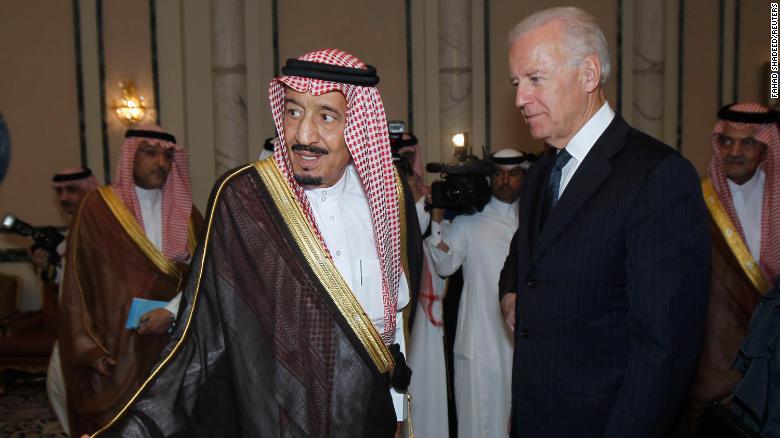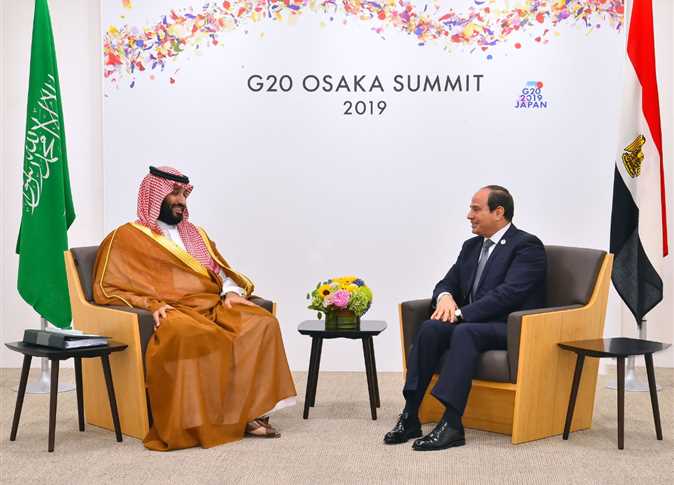
Abu Dhabi (CNN) – Less than a month into his presidency, the White House said Joe Biden would “recalibrate” his relationship with Saudi Arabia, effectively refusing to speak to the Kingdom’s de facto ruler, Crown Prince Mohammed bin Salman.
Biden would speak with his counterpart, 86-year-old King Salman, said White House spokeswoman Jen Psaki last February. It is the crown prince, however, who handles day-to-day affairs of the kingdom, including oil policy.
But a lot has changed over the past 12 months. Inflation is now at its highest in 40 years, midterm elections loom and Russia has just plunged Europe into its biggest security crisis in decades by invading Ukraine. But perhaps most importantly for America’s relationship with the Middle East, oil prices have soared above $100 to an eight-year high.
Brent crude breached $100 per barrel for the first time since 2014 Thursday after Russian troops attacked Ukraine. Western states are now scrambling to find alternative sources of energy should Russia’s vast supplies of oil and gas be interrupted.
Biden’s appeals for more oil from OPEC’s de-facto leader Saudi Arabia have thus far been rebuffed by King Salman, who has pledged to stick to the oil cartel’s pact with Russia to limit production hikes. The kingdom has about 2 million barrels of spare capacity.
But as diplomacy broke down with Russia over the past week, progress was made on another front, in Vienna, where world powers have been negotiating with Iran to revive a 2015 nuclear agreement that President Donald Trump abandoned in 2018. A conclusion of the agreement could give Washington and global oil markets much needed reprieve by releasing Iranian oil that was sanctioned by the United States.
Biden is now faced with a dilemma. Does he reconsider his refusal to call the crown prince of his closest Middle East partner and make a new appeal to Saudi Arabia? Or might he find an unlikely savior in his biggest Middle East foe, Iran?
How Putin’s attack on Ukraine unfolded inside the White House
Biden’s issue with the crown prince is personal, said Abdulaziz Sager, chairman of the Saudi-based Gulf Research Center. “If you have something that you wanted to deliver to Saudi, as a message, or to the crown prince, say it loud and clear. Say this is what you want,” he said. “It’s only logical” for the US to change its approach to Saudi Arabia with oil at $100, he added.
But even if Saudi Arabia agrees to raise output, will that relieve pressure on oil prices? Not necessarily, said Ellen Ward, senior non-resident fellow at Washington’s Atlantic Council. “The [OPEC] oil ministers have indicated that they are skeptical about the ability to set prices precisely simply by increasing production,” she said. “In other words, the causes of the recent rise in oil prices are due more to financial speculation and geopolitical risk than a lack of supply.”
And even if Biden makes that much anticipated call to the crown prince, “there is no indication that Mohammed bin Salman would capitulate because of a personal request,” she added.
If the Russia-Ukraine crisis drives oil to about $110 a barrel, US inflation would exceed 10% on a year-over-year basis, according to consulting firm RSM. That hasn’t happened in the US since 1981 and would cause a “real short-term shock,” it said.
The predicament Biden faces won’t go unnoticed in Tehran, possibly strengthening its hand at the Vienna negotiations. On Wednesday, it recalled its top negotiator for consultations and called on the West to be “realistic” about talks.
S&P Global Platts expects that an interim nuclear deal could allow Iranian exports to grow by 500,000 barrels per day (bpd) in April and May, while a comprehensive agreement could allow 1.5 million bpd of export growth within nine months. Iran pumped 3.83 million bpd before Trump’s pullout from the nuclear pact in 2018.
“Every US president used to lobby Saudi Arabia to increase production,” and the kingdom often obliged, said Yousef Alshammari, senior research fellow at London’s Imperial College. “During the past four years we saw Saudi Arabia either raising production or making voluntary cuts during the Trump era. But now the kingdom is sticking to a more standard approach.”
The more Biden “personalizes” his dispute with Saudi Arabia, the more it will force the kingdom to seek strategic alternatives to the US, Sager said.
“I don’t think that Saudi Arabia is going to allow the situation between the US and Russia to jeopardize its relationship with Russia,” said Ward. “The energy relationship between Saudi Arabia and Russia exists outside of the geopolitical issues between Russia and Ukraine and as long as Saudi Arabia can remain above the situation without having to choose sides, it will likely refrain from even commenting on Russia’s actions in eastern Ukraine.”




